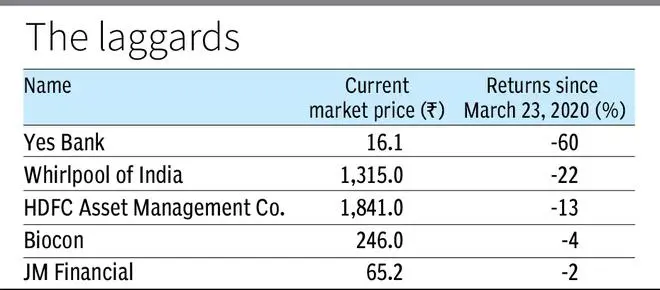From the Covid lows of 7,600 levels in March 2020, Nifty 50 has almost grown 2.4 times to 18,300 levels now. But not all companies have really recovered from their Covid lows. Out of the 435 stocks that were part of the Nifty 500 index then, about 60 per cent of them have managed to outperform the index, while the balance 40 per cent failed to keep pace with the benchmark. Out of these 435 stocks, 5 of them are trading at levels even below their March 2020 lows, thereby underperforming the Nifty 50 and Nifty 500 significantly.

The laggards
Topping the losers’ list is the stock of Yes Bank, having shed over 60 per cent since March 23, 2020, the day when Nifty 50 closed at the lowest level of 7,610. While stocks across the board were tanking in the second half of March 2020, surprisingly Yes Bank stock was on a gravity-defying rise. The stock, which had already crashed a few weeks earlier after RBI seized control to revive the bank, started seeing a rebound after it received fresh investments and more importantly from short covering after restrictions were placed on the sale of its shares in the markets. Thus, it has seen a 60 per cent correction now, post the short-covering rally in March 2020.
Second on the losers’ list is the stock of Whirlpool of India Limited, which has lost over 22 per cent since March 2020. The company’s inability to pass on raw material cost increases and the resultant impact on the company’s profitability led to the underperformance of the stock over the last three years.
Also read: Not attractive for now; Indian equity markets are richly valued: Credit Suisse
HDFC Asset Management is the other stock that has fallen 13 per cent since the March 2020. This is thanks to the modest performance in FY23 due to slow growth in the assets under management (AUM) on account of competition from larger AMCs, such as SBI, which have managed to consistently grow their AUM. Also, higher costs ate into the company’s profitability resulting in margin erosion.
Also, the partial offloading of stake by partner Abrdn Investments (formerly Standard Life Investments) in June 2022, resulting in their holding reducing from 16 per cent earlier to about 10 per cent now, has also had a negative rub-off on the stock.
Biocon, the Bengaluru-based biopharmaceutical company, also saw its stock price tumble by 4 per cent over the last three years. Weak performance in FY21 and FY22, both on the revenue front and operating profit front, was among the reasons for the stock’s underperformance.
JM Financial also saw its stock price decline by 2 per cent since March 2020. While the company’s performance has improved marginally in FY22, as compared to FY21, the company is yet to get back to its pre-Covid operating profit margin levels of 60 per cent plus. In FY23, the company’s revenue declined 12 per cent, while the profit shrunk by over 28 per cent, compared to the previous year.





Comments
Comments have to be in English, and in full sentences. They cannot be abusive or personal. Please abide by our community guidelines for posting your comments.
We have migrated to a new commenting platform. If you are already a registered user of TheHindu Businessline and logged in, you may continue to engage with our articles. If you do not have an account please register and login to post comments. Users can access their older comments by logging into their accounts on Vuukle.